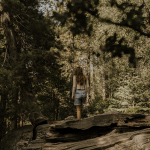
With the ever-growing popularity of digital pastimes and with many unable to access traditional facilities due to COVID, it’s now more important than ever to make sure our mental health and well-being is taken care of. One great way we can do this is through outdoor recreation – research suggests that simple things like taking a walk in nature or engaging in physical activities outside can be hugely beneficial for our mental health. In this blog post, we’ll explore how outdoor recreation can help us maintain good levels of mental health and overall well-being – no matter what stage you are at on your journey.
The Role of Nature in Reducing Stress, Anxiety, and Depression
Outdoor recreation provides numerous benefits for physical health, but it also plays an important role in maintaining good mental health and well-being. Specifically, spending time in nature has been found to have a profound impact on reducing stress, anxiety, and depression.
The calming effects of nature are well documented – spending time in natural environments can help to lower cortisol levels and reduce symptoms of anxiety and depression. Additionally, physical activity in outdoor settings can release endorphins, which can help to alleviate symptoms of depression and improve overall mood.
Outdoor recreation also provides an opportunity to disconnect and unplug from the constant demands of technology and modern living. This can help to reduce feelings of burnout, fatigue, and work-related stress. Instead, engaging in outdoor activities can foster a sense of connection and meaning that can help to improve overall life satisfaction and well-being.
How to Make Time for Outdoor Recreation – Tips and Ideas
In our fast-paced world, finding the time for outdoor recreation may seem like a daunting task. However, making time for these activities is essential for maintaining good physical and mental health. Here are some tips and ideas to help you fit outdoor recreation into your busy schedule:
- Schedule it in – Treat outdoor recreation like any other important commitment and schedule it into your day or week. This can also help ensure that you have the necessary equipment and supplies handy.
- Take advantage of lunch breaks – Use your lunch break to take a short walk outdoors or find a local park or green space that you can easily access during your break.
- Plan for the weekends – Use weekends to plan more extensive outdoor recreational activities. Look for parks, trails, or nature reserves within driving distance, or consider camping or hiking in a nearby wilderness area.
- Make it a family affair – Encourage loved ones to join you in your outdoor recreation activities. This not only promotes quality time with family and friends but also holds you accountable for your plans.
- Mix up your routine – Switch up your routine by trying out new activities such as kayaking, rock climbing, or mountain biking. This can help keep things exciting and offer new challenges to keep you engaged.
- Join a group – Find a local outdoor recreation club or group that shares your interests. This not only provides accountability but can also help you meet new people and make new friends.
- Find creative alternatives – If time is a challenge, look for creative alternatives such as indoor rock climbing gyms or join online communities that can suggest new outdoor activities.
Exercise Outdoors – The Benefits of Moving Your Body
Exercise is vital for maintaining physical health, but did you know that moving your body in the great outdoors can also provide additional benefits? Here are some of the benefits of exercising outdoors:
- Improved mental health – Studies have shown that outdoor exercise can reduce stress, anxiety, and depression while improving overall mood and well-being. The fresh air, sunlight, and natural surroundings can all contribute to a boost in mental health.
- Increased Vitamin D – Exposure to sunlight while exercising outdoors can increase Vitamin D production in the body, which is essential for strong bones, immune function, and overall health.
- Greater calorie burn – Outdoor exercise can provide greater calorie burn than indoor exercise due to the varied terrain, wind resistance, and varying temperatures.
- Increased creativity – Being in natural environments and engaging in physical activity has been shown to increase creativity and cognitive function. This can help you to approach tasks with a fresh perspective and come up with new ideas.
- Greater engagement – Exercising outdoors can provide a greater sense of engagement with your surroundings, which can help to combat boredom and keep you motivated.
- Improved physical performance – Varying terrain and wind resistance can challenge your body in new ways and improve overall physical performance, leading to increased stamina and endurance.
Connecting with Other People – Bonding Through Outdoor Activities
Connecting with others is an essential part of maintaining good mental health and well-being. Outdoor activities provide a great opportunity to bond with family, friends, and even strangers through shared experiences. Here are some of the benefits of bonding through outdoor activities:
- Shared experiences – Participating in outdoor activities such as hiking, camping, or kayaking can create shared experiences that are both unique and memorable. These shared experiences can help to strengthen friendships and create a sense of connection among individuals.
- Increased communication – Being in a natural setting can encourage deeper conversations and open communication among individuals. This can help to build trust and understanding in relationships.
- Enhanced teamwork – Outdoor activities often require cooperation and teamwork, which can help to build stronger bonds among participants. This can be particularly true for activities like rock climbing or rafting, where a high level of teamwork is required for safety and success.
- Quality time – Outdoor activities provide an opportunity to disconnect from technology and the distractions of daily life, allowing for quality time to be spent with loved ones. This can lead to deeper and more meaningful connections.
- New friendships – Participating in group outdoor activities can provide opportunities to meet new people, form new friendships, and build a sense of community. This can help to combat feelings of loneliness and social isolation.
Conclusion
Outdoor recreation can provide a wealth of benefits for mental health and well-being. From improved physical performance to increased creativity, bonding with others, and enhanced teamwork, outdoor activities can lead to greater engagement with the world around you, improved mental health, and a deeper sense of connection. So get outside and enjoy all that nature has to offer!





